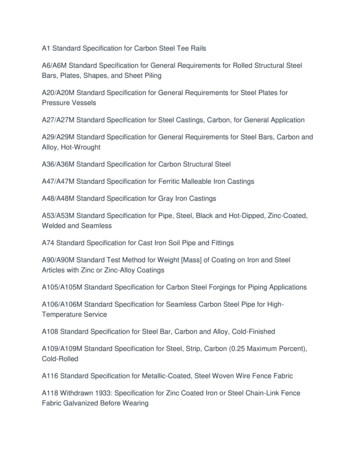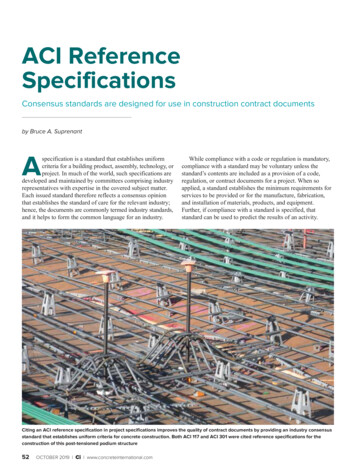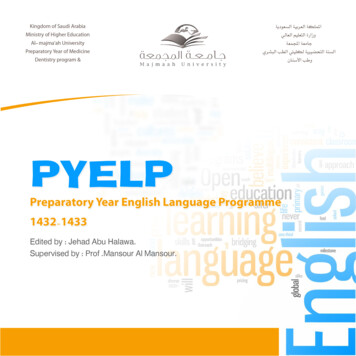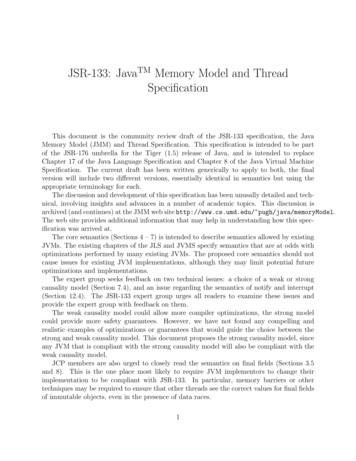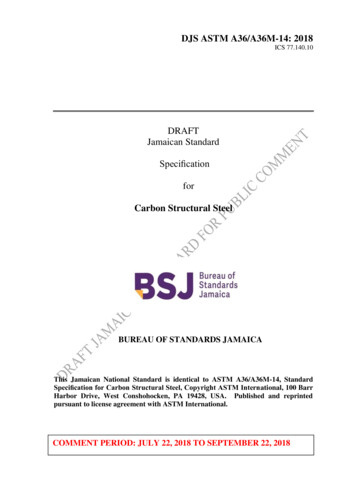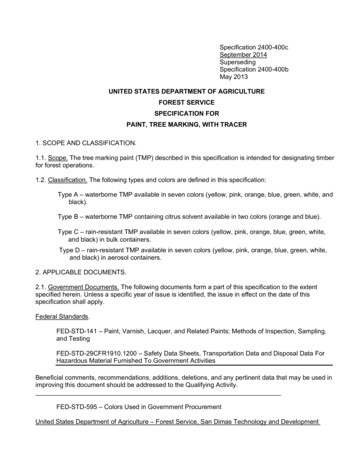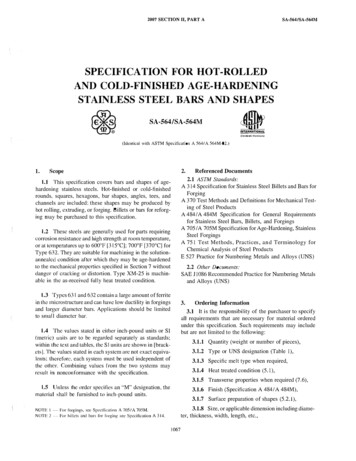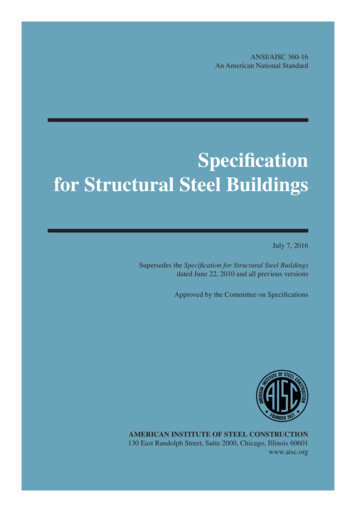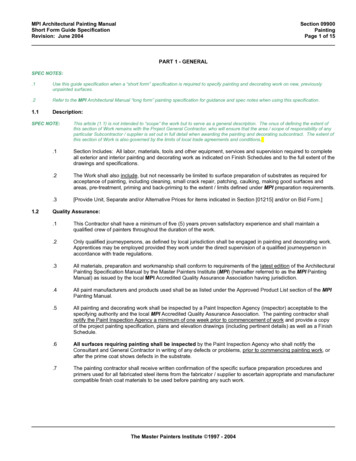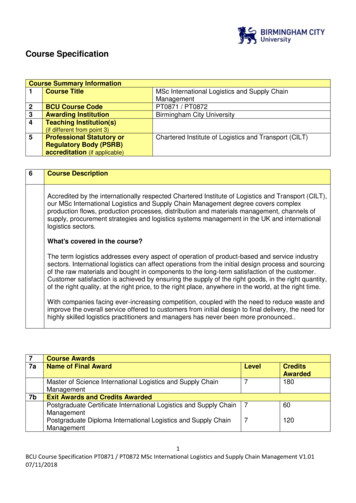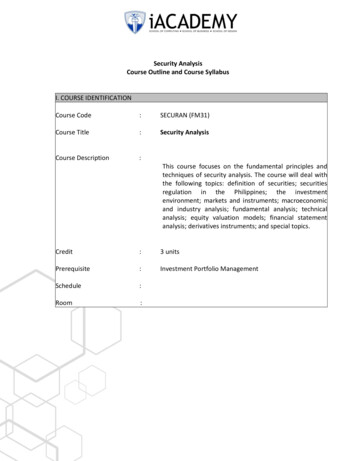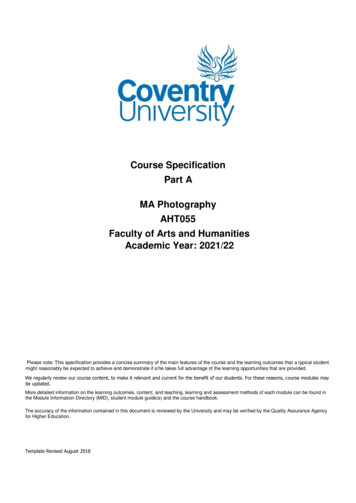
Transcription
Course SpecificationPart AMA PhotographyAHT055Faculty of Arts and HumanitiesAcademic Year: 2021/22Please note: This specification provides a concise summary of the main features of the course and the learning outcomes that a typical studentmight reasonably be expected to achieve and demonstrate if s/he takes full advantage of the learning opportunities that are provided.We regularly review our course content, to make it relevant and current for the benefit of our students. For these reasons, course modules maybe updated.More detailed information on the learning outcomes, content, and teaching, learning and assessment methods of each module can be found inthe Module Information Directory (MID), student module guide(s) and the course handbook.The accuracy of the information contained in this document is reviewed by the University and may be verified by the Quality Assurance Agencyfor Higher Education.Template Revised August 2018
PART A Course Specification (Published Document) MAPhotography1. IntroductionThe MA Photography course at Coventry University offers an exciting opportunity for emerging practitioners in thefield of photography and its associated forms to develop their work via a series of key interrogations. In providingspaces for exploration and reflection in relation to publics, visual strategies and the contextual location ofindependent work, the course presents a distinctive way for students to explore the possibilities of their workalongside a longitudinal development of their core practice. The course challenges students to imagine, and workwith, new audiences, processes and professional futures in order to enter into a sustainable and flexible careerworking with images.Sitting within a cluster of postgraduate courses at Coventry’s School of Media and Performing Arts, the curriculumwill encourage and facilitate working across disciplines and with peers employing different processes, tools andtechniques. The course welcomes practitioners with diverse backgrounds and adopts an approach to photographywhich considers practice not as isolated from associated mediums and methodologies but within an ‘expanded field’(Baker, 2005). In this manner, students on the MA Photography may work with archives, produce installation pieces,publish, run collaborative projects and blur traditional genre and medium boundaries. The course has beenconstructed to provide essential places of experimentation and diversification of skills and knowledge, whilst alsoencouraging rigour in the student’s practice which leads to its robust situation within social, political, and visualcontexts.As part of the School of Media and Performing Arts in the Faculty for the Arts and Humanities, the MA inPhotography is supported by a range of scholars and practitioners as well as peers working across mediums andfields. Run by the photography team who built an innovate and successful BA course (3 times Guardian no 1 rankedcourse in the last decade), this MA is able to build upon the many established connections, visiting speakers andresources that make Coventry an ideal place to further your photographic career. The curriculum will challenge andsupport your existing work, and in a symbiosis of research and practice will engender a robust and rigorous way ofworking that can be adapted to radically reformulating landscape of photography.As part of this course students will undertake a transnational development module which is designed to offer skills asencouraged by the Institute of Leadership and Management. This module also offers the choice to tailor professionalskills from a menu focussing on leadership, transcultural communications and professional skills.Professional ExperienceDuring semester one, students can apply for the extended route, which offers an opportunity to reflect upon and gainprofessional experience through three semesters of internship or placement* with a host of different organisations.Students can also undertake or participate in supervised, campus-based University projects. The professionalexperience supports the development of students’ personal and professional skills, such as communication, teamworking, self-management, project working and critical reflection to enhance their future employability. Thisexperience will build up on students’ previous learning and experiences and encourage them to reflect on their workand skill sets prior to undertaking the final sixty credits of M level study.Professional experience placements may be paid or unpaid, and this will depend on what is being offered andagreed with the host organisation. Internships can be international, within the UK or may be internal, within theUniversity. Students who secure appropriate campus-based professional experience, may undertake supervisedprojects, related research and activities designed to offer students the opportunity to develop and integratecurriculum related skills with an understanding of professional practice.*Internships and placements are subject to competitive application, availability and additional fees.2 Available Award(s) and Modes of StudyTitle of AwardMode ofattendanceFHEQ LevelUCAS Code3
MA Photography with Professional Placement ExperienceFT 2 years/FT 1year/PT 2 years7MA PhotographyPGDip PhotographyPGCert Photography3 AwardingInstitution/BodyCoventry University.4 CollaborationN/ACoventry University, delivered on-campus with one module delivered online5 TeachingInstitution andLocation of delivery6 InternalApproval/ReviewDates7 Course AccreditedbyDate of latest review: (06/2020)Date for next review: (Academic year 2026/2027)N/A8 Accreditation Date N/Aand Duration9 QAA SubjectThis document takes note of the QAA Subject Benchmark Statement for Art and DesignBenchmark(2017), and Communication, Media, Film and Cultural Studies (2019) whilst noting theirStatement(s) and/orapplicability to undergraduate courses:other external factorsArt and DesignCommunication, Media, Film and Cultural StudiesThis document takes note of the generic benchmark document for Masters e/master's-degree-characteristics10 Date of CourseSpecificationJune 202011 Course DirectorMatt Johnston12 Outline and Educational Aims of the CourseMA Photography will focus on exploring the creative possibilities and boundaries of photography and its expandedforms.This course provides a unique opportunity for students to be immersed in a field of contemporary photographicpractice––building their profiles as independent reflexive practitioners while they learn. Their artistic development willbe nurtured through an engagement with a range of contextualising theoretical models, including public art, visualanthropology, community photography, post-digitality, post-photography and publishing. This conceptual underpinningprepares students to reflect critically on practices and frameworks relevant to their own work, while developing theirown artistic practice and models making.The educational aims for the course are in line with the University mission statement, which pertain for the School ofMedia and Performing Arts as a whole.MA Photography aims enable: Opportunities to develop a rigorous critical understanding of current and emerging critical-contextual4
frameworks and key debates relation to the student’s own emerging practice. Engagement with a critical-creative process which evaluates and employs appropriate methods in theproduction of original work. The ability to locate their practice in relation to contemporary and historic practices as well as professionalcontexts. Opportunities to work collaboratively in response to emerging issues and debates in contemporary societyand to critically reflect on the communicative properties of their responses. The resolution of complex and nuanced praxis for specific audiences within, and outside of, traditionalpresentational spaces for photography and research.13 Course Learning OutcomesThe course outcomes have been mapped against the 6 pillars of the Education Strategy:a)b)c)d)e)f)Creativity & enterpriseIntercultural & international engagementCommunity contribution and responsibilityInnovation & digital fluencyEmployabilityResearch-inspired teachingOn successful completion of the course a student will be able to:1. Identify, define and propose a creative and original body of work which is supported by advanced researchand contextual understanding. (a, d, e)2. Critically analyse photographs as well as their modes of production and display in socio-political contextsassociated with a chosen field of photographic practice. (b, f)3. Engage with a robust critical-creative process and apply advanced technical and methodological skills specificto the creation of photographic work. (a, d)4. Experiment with, and critically evaluate, a variety of means by which photographic work can be communicatedto identified audiences. (a, c, e, f)5. Demonstrate the ability to work with, and synthesize, complex themes across written, oral and visual outputs.(a, c, e)6. Collaborate with practitioners in associated fields to respond creatively to stimuli that relates to socio-political,technological and artistic environments. (b, c, d, e)7. Explore and evaluate the creative, technical and business opportunities arising in the global cultural industriesfor their photographic practice, and integrate these into their project, business or career aims. (a, e)14 Course Structure and Requirements, Levels, Modules, Credits and AwardsProfessional ExperienceDuring semester 1, students who have expressed an interest in undertaking a work placement or internship shouldbegin the application process for these opportunities. Students have the responsibility for securing aplacement/internship. They will be supported throughout the application process by a specialist employer engagementteam. The university will work with employers to identify opportunities. Subject to securing a placement/internship, the5
International Student Support team will work with international students to obtain UK study visa extensions. Visasrequired to work in other countries will be the responsibility of the student.The course is structured so that students complete two semesters of taught modules and then could spend threesemesters on professional experience placement. During this time students would be enrolled onto modules7055MAPA, 7056MAPA, and 7057MAPA. The modules are zero credit and do not contribute to the classification ofthe award but must be passed to complete the placement. Upon completion of the work placement, students wouldreturn to Coventry to complete the final semester during which time they undertake their project module which may beinformed by the learning acquired during the professional experience.Cascade of Awards:MA Photography with Professional Experience Placement MA Photography PGDip Photography PGCert PhotographyInterim Awards will be offered at 60 credits (PGCert Photography) and 120 credits (PGDip Photography) alongside180 credits (MA). These awards will be offered at early withdrawal from the MA Photography course and are notstructured as programmes of study within their own right.Modules within the course, their status (whether mandatory or options), the levels at which they are studied, and theircredit value are identified in the table yorOptionalMMMMMCourseLearningOutcomes2, 5, 6, 72, 3, 4, 53, 4, 51, 31, 3, 4, 5, 7Photographic situationsPhotography and PublicsObjects, spaces and boundariesResearch MethodsFinal Major Project: Research andPlanningFinal Major Project: Production andSharingCollaborative Community ProjectCollaborative Enterprise ProjectCollaborative social challengeprojectTransnational ProfessionalDevelopment30M1, 2, 3, 4, 5, 7101010MMM3, 63, 63, 610M76
CreditModule CodeTitleCreditMandatory/Course LearninglevelValueOutcomesOptionalSubject to securing an appropriate placement opportunity and fulfilling the selection requirements, students willbe transferred to the two-year course and the zero credit modules listed below are to be taken.77055MAPAExtended Masters0Optional6, 7Professional ExperienceModule A77056MAPAExtended Masters0Optional6, 7Professional ExperienceModule B77057MAPAExtended Masters0Optional6, 7Professional ExperienceModule CThe work placement is to be taken over three semesters and prior to the final dissertation/project that must be takenin the final semester of the course.Delivery Patterns:The MA Photography has three possible entry points (September, January and May) and students can study in bothF/T and P/T modes. Students on the programme will follow one of the delivery patterns outlined in the tables below.Delivery PatternFull TimeStarting SemesterSeptemberSemester 1 (Sept)Semester 2 (Jan)Objects, Spaces andBoundaries (20)Photography andPhotographicPublics (20)situations (20)Final Major Project:Final Major Project:Research and Planning Production and(30)Sharing (30)Research Skills orative SocialChallenge Project (10)CollaborativeCommunity Project(10)Delivery PatternStarting SemesterFull TimeJanuarySemester 1 (Jan)Semester 2 (May)Photography and Publics Photographic(20)Situations (20)Final Major Project:Research andResearch Skills (20)Planning (30)Semester 3 (May)CollaborativeEnterprise Project(10)Semester 3 (Sept)Objects, Spacesand Boundaries(20)Final Major Project:Production andSharing (30)7
ive CommunityProject (10)Collaborative SocialCollaborativeChallenge ProjectEnterprise Project (10) (10)Delivery PatternFull TimeStarting SemesterMaySemester 1 (May)Semester 2 (Sept)Semester 3 (Jan)Photographic Situations Objects, Spaces and Photography and(20)Boundaries (20)Publics (20)Final Major Project:Final Major Project:Research and Planning Production andResearch Skills (20)(30)Sharing ative SocialCommunity ProjectDevelopment(10)Challenge Project (10) (10)Collaborative EnterpriseProject (10)Delivery Pattern Part TimeStartingSemesterSemester 1(Sept)SeptemberSemester 2 (Jan)Semester 3 (May)Research Skills Objects, SpacesPhotographic(20)and Boundaries (20) Situations (20)CollaborativeCollaborativeCollaborativeSocial Challenge Community Project Enterprise ProjectProject (10)(10)(10)Semester 1 (Y2)(Sept)PhotographicSituations er 2 (Y2)(Jan)Semester 3 (Y2)(May)Final MajorFinal Major Project: ProjectResearch and(Production andPlanning (30)Sharing) (30)Delivery Pattern Part TimeStartingSemesterJanuarySemester 1(Jan)Semester 2 (May)Research Skills Photographic(20)Situations (20)Semester 3 (Sept)Semester 1 (Y2)(Jan)Objects, SpacesPhotographyand Boundaries (20)Publics (20)Semester 2 (Y2)(May)Semester 3 (Y2)(Sept)Final MajorFinal Major Project: Project:and Research andProduction andPlanning (30)Sharing (30)8
CollaborativeCommunityProject (10)CollaborativeEnterprise Project(10)TransnationalCollaborative Social ProfessionalChallenge Project Development (10)(10)Delivery Pattern Part TimeStartingSemesterSemester 1(May)MaySemester 2 (Sept)Semester 3 (Jan)Semester 1 (Y2)(May)Research Skills Objects, SpacesPhotography(20)and Boundaries (20)Publics (20)and PhotographicSituations ativeCollaborativeDevelopment (10)Social Challenge Community Project Enterprise ProjectProject (10)(10)(10)Semester 2 (Y2)(Sept)Semester 3 (Y2)(Jan)Final MajorFinal Major Project: Project:Research andProduction andPlanning (30)Sharing (30)15 Criteria for Admission and Selection ProcedureGeneral requirements are in line with University Policy. Specific entry requirements can be found via the ‘EntryRequirements’ tab on the course web page. Successful applicants are usually expected to hold a good honours degree,or equivalent.Applicants to this Masters degree should normally possess a good honours degree (2:1 or equivalent). If the degree isin an unrelated subject, applicants need to demonstrate relevant industry knowledge and experience to bedocumented in their application statement, as per below. Candidates with professional/industrial experience, and/orother relevant training and experience may be admitted with lower qualifications. Non-traditional entry students arewelcome: applicants without formal qualifications but professional/industrial experience may be admitted on the basisof interview and submission of supporting material (see below).Students whose first language is not English must demonstrate proficiency in the English language equivalent toIELTS6.5.Each application will be required to include a ‘statement of intent’ (500), and applicants may be required to provideother supporting material, e.g. full marks/results records, or examples of their practical, professional or academicwork. Eligible applicants will be interviewed by videoconferencing.For students entering with advanced standing, the course conforms to the standard university RP(E)L procedureFurther information can be found via the Postgraduate Study page: duate-study/16 Academic Regulations and Regulations of AssessmentThis Course conforms to the standard University Academic Regulations Postgraduate Mode R.17 Indicators of Quality EnhancementThe MA Photography is managed by the School of Media and Performing Art’s Board of Study of the Faculty of Artsand Humanities. The Course and its constituent modules are quality assured by the Board of Study (BoS).9
The Progression and Awards Board (PAB) within the Faculty of Arts and Humanities is responsible for considering theprogress of all students and making awards in accordance with both University and course-specific regulations.The assurance of the quality of modules is the responsibility of the Boards of Study which contribute modules to thecourse.External Examiners have the opportunity to moderate all assessment tasks and a sample of assessed work for eachmodule. They will report annually on the course and/or constituent modules and their views are considered as part ofthe Course Quality Enhancement Monitoring (CQEM). Details of the CQEM process can be found on the Registry’sweb site.Students are represented on the Student Forum, Board of Study and Faculty Board, all of which normally meet two orthree times per year.Student views are also sought through module and course evaluation questionnaires and the Postgraduate TaughtExperience Survey (PTES).Student career or project trajectories throughout the course should mirror those in industry, freelance or art worldcontexts. The flexible structure has been designed to accommodate technical and creative developments. The course has been designed in accordance with the QAA benchmark statements for Art and Design 2017and Communication, Media, Film and Cultural Studies 2019.The School has a strong portfolio of practice and academic research, and 71% of the REF 2014 submissionwas ranked 3 or 4* in the Art and Design: History, Practice and Theory categoryThe BA (Hons) Photography course has ranked 1st in the Guardian League Tables 3 times in the last tenyears and has remained in the top 10 for X yearsThe University was awarded a gold rating for teaching excellence in the Teaching Excellence Framework(TEF) 2017The University was rated Top 4 for Student Experience and Teaching Quality in The Times and The SundayTimes Good University Guide 2017The University has been rated in the top 15 for five years running in the Guardian University Guide(20162020)Coventry has been awarded University of the Year for Student Experience (The Times and Sunday TimesGood University Guide 2019)Coventry University has received an overall 5-star rating from QS.All courses are subject to a major review involving subject experts external to the University, normally on a three-yearcycle. At these reviews the views of current and former students and employers are sought where appropriate.Staff development follows the School of Media and Performing Arts strategy. Members of the School have undertakenthe University’s PGCert in Higher Education, are members of external academic and professional bodies, andparticipate in internal staff development activities.Members of the BA course team who shall contribute to this MA course are internationally regarded, workingprofessionally in a range of industries as artists, writers, editors, cultural producers, and photographers. They haveworked for diverse clients such as Harley Davidson, The Sunday Times Magazine, Channel 4 and Comic Relief aswell contributing to the reviewing of national and international awards like the Google and Saatchi image competitionand several photobook prizes. Members of the team has exhibited work at the New Art Gallery, Wallsall, IC VisualLab, Bristol, Artvilnius, Lithuania and the Jaipur Photography Festival, India, all of which is symbiotic with researchprofiles that position them as experts in particular areas of photographic practice – spanning family photography andthe role of the studio, through photobooks and their readers, to photography as a participatory practice and themateriality of the archive. All members of the Course Team hold qualifications in teaching and learning in highereducation and have extensive pedagogical experience having worked at, and with, a number of UK. The team holds anumber of accolades and positions in relation to their pedagogical practice – from external examiner proles at five UKuniversities to guest lectures internationally, keynote speeches, the hosting of the annual APHE (Photographers inHigher Education) conference (2019), and a National Teaching Fellowship.10
18 Additional InformationEnrolled students have access to additional, key sources of information about the course and student supportincluding: Student Handbook Module Guides Module Information Directory Faculty of Arts and Humanities Handbook Study Support information is accessible from student services home page11
The MA Photography course at Coventry University offers an exciting opportunity for emerging practitioners in the field of photography and its associated forms to develop their work via a series of key interrogations. In providing spaces for exploration and reflection in relation to publics, visual strategies and the contextual location of .
